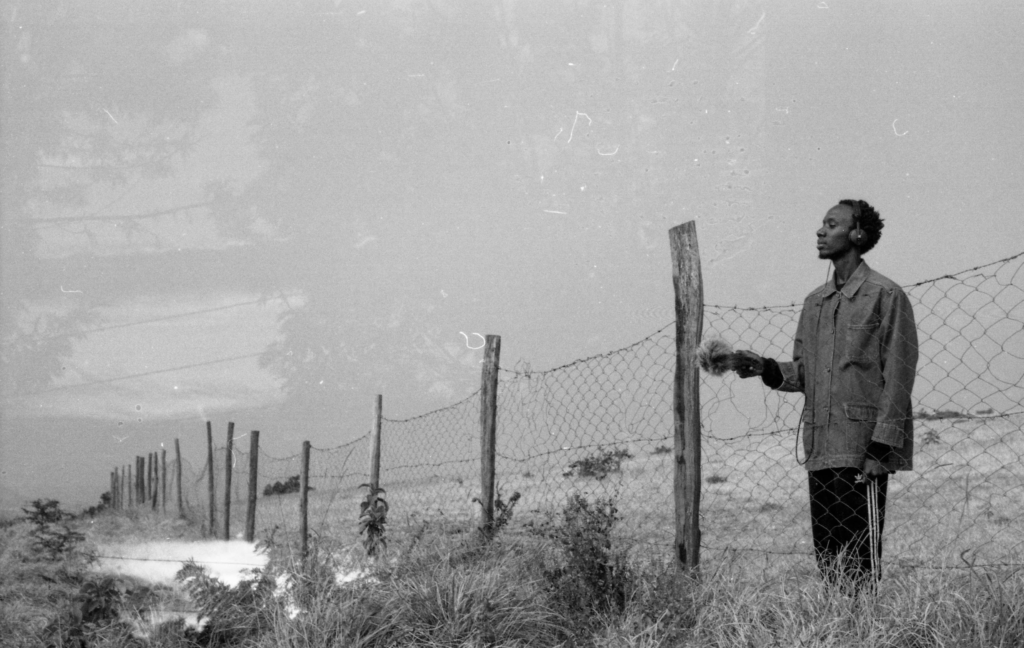Born in Nairobi and currently based in Berlin, KMRU is a sound artist and producer whose methods include field recording, improvising, noise, machine learning, radio art and drones. His music has earned praise from NPR, Pitchfork, Resident Advisor, DJ Mag and Bandcamp. In 2020, he released three albums that showed the depth and range of his sound: Peel, an LP of hypnotic drones on the avant-garde institution Editions Mego label; Opaquer, a collection of vivid and dreamlike sound sculptures; and Jar, a dreamlike cassette of found sounds and analogue ambience. These records, along with his compilation appearances and self-released EPs, have turned heads around the world and earned him a place in many of 2020’s year-end lists.
KMRU is playing at Insomnia Festival on 23 October. More info here.
Could you describe the sounds you’re hearing at the moment? Perhaps you could send us a short recording or a photo?
It´’s a calm noon, and everything is relatively still, but the outside is droning, always composing itself. The birds are chirping and bells are singing – that‘s my glimpse of the outside.
How do you approach field recordings? Do you record as a sort of audio diary, without knowing how you will use the particular sound, or do you know before you start recording where it will find its place in your work?
Some field recordings are part of a sonic journal that I keep, while other recordings are specific and intentional in terms of how they’ll be used for a specific project. So the planning of the field trip is centred around a specific goal that I want to explore in a piece, a composition, but is always open for spontaneity in the field.
Can you talk about machine learning, and what role it plays in your music-making?
I first explored machine learning tools while at residencies in Russia and in Montreal and through collaborative projects with Moisés Horta. As for my projects, at the moment, I’m not using many machine learning processes, although sometimes I train datasets of field recordings and see what outputs I can get and use the outputs as sources for compositions. Machine learning models in my projects enable explorations of new connections and collaborations in abstract and metaphorical ways.
Do you feel that studying at UDK (Berlin University of Arts) has altered your approach to sound-making?
I don’t think it’s altered my approach to sound-making, but I have more possibilities in terms of how to approach the processes and output of the works.
You also manage the musical estate and the political activism of your grandfather, the celebrated activist, and Benga musician Joseph Kamaru. Could you talk about his work and life, his influence on you, and how you approached a kind of media archaeology of his work?
My grandfather’s music was mostly associated with Kenyan memories from the 1960s during its liberation from the colonial hegemony in the country. His prolific catalogue of music covered a wide array of discourses that the majority of the people in Kenya related to in their daily lives. I grew up knowing my grandfather was a renowned musician in the country, although it wasn’t until I was in High school that I appreciated his works and their role in various political and social areas. One thing that I got a lot of from my grandfather was the aspect of authenticity and what that means in terms of being an artist. From all the conversations I had with him, I feel that I served an apprenticeship with him. The reissue project has been a personal project and I appreciate the process of seeing it evolve and grow. Working on the archive is a process of rediscovery of my grandfather’s life and music.
You are part of an initiative called Black Bandcamp, a DIY effort to promote music from Black artists and labels. Can you talk about it?
Black Artist Database (B.A.D.) represents Black artists, labels, projects, and individuals in the global Black community of electronic music. There’s an inequality gap in the electronic music scene, controlled by power structures set upon, and B.A.D. aims to encourage those in positions of power to bridge this inequality gap actively and represent Black people from the continent and its diaspora. Black Bandcamp initially started from a spreadsheet which was being shared among friends, featuring Black folk artists during Juneteenth Bandcamp Day, and the spreadsheet was distributed and reshared online among many electronic musicians. The hope was to support Black-owned labels and Black musicians and artists, the majority of whom are always marginalised.
Is activism as such, in music and arts, something that you feel like engaging with more in the future?
Definitely. All art and music is and should be something that probes an aspect of society. This is something I have been thinking a lot about with regard to the work that I‘m doing, both at university and also in my artistic projects. I am always reflecting on what my work posits in a sound art and listening discourse, and also in social contexts.
Interview: Lucia Udvardyova
Photo: Thukia
